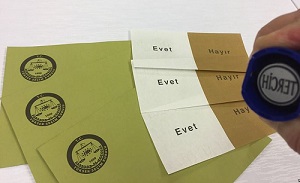Turkey’s Constitutional Referendum and Erdogan’s Faded Democratic Credentials
by Gareth H. Jenkins
June 1, 2017
The Turkish constitutional referendum of April 16, 2017 dealt yet another blow to President Tayyip Erdoğan’s already faltering claim to democratic legitimacy. Not only did both the referendum and campaign that preceded it fall short of democratic norms but the Turkish authorities’ refusal to investigate the numerous reports of fraud and apparent irregularities suggests that the regime no longer feels the need to maintain even the semblance of the rule of law.

Ticking Clocks: Erdoğan and Turkey’s Constitutional Referendum
By Gareth H. Jenkins
March 31, 2017
Whatever the outcome, the Turkish constitutional referendum on April 16 will not resolve the country’s chronic domestic instability, heal its deepening social divisions, revive its flagging economy or end its growing international isolation. But it will shape both the nature of the further turbulence to come and the duration of what is already the final stage of the Erdoğan era.

Will Turkey Get a New Constitution That is a Societal Compact, and Not a Dictate of the State?
By Halil M. Karaveli (vol. 4, no. 20 of the Turkey Analyst)
The members of the constitutional reconciliation commission in the Turkish parliament that convened last week have been instructed to draft a constitution that enshrines liberty. It is also officially recognized that the new constitution of Turkey needs to be societal compact that reflects the pluralism of society. However, it is still a political tradition that puts the state above society that is the dominant force. The rulers of Turkey continue to adhere to the age-old Turkish political axiom that the state knows best, circumscribing true participatory democracy.
Turkey's New Constitution: a Last Change to Solve the Kurdish Issue?
By Gareth H. Jenkins (vol. 4, no. 19 of the Turkey Analyst)
On October 1, 2011, 25 deputies from the pro-Kurdish Peace and Democracy Party (BDP) and five pro-Kurdish independents were formally sworn in as members of the Turkish parliament, abandoning a three month-old boycott of the assembly in protest at the continued imprisonment of another five BDP candidates who had won seats in the June 12, 2011, general election. The ruling Justice and Development Party (AKP) had already announced that its priority over the months ahead will be the drafting of a new constitution. The decision by the thirty pro-Kurdish deputies to take up their seats in parliament has raised hopes of a sustained dialogue with the AKP and the possible inclusion in the new constitution of sufficient concessions to solve Turkey’s Kurdish problem and persuade the Kurdistan Workers’ Party (PKK) to lay down its arms. However, although the presence of the pro-Kurdish deputies in Ankara does create the opportunity for dialogue and a short-term reduction in tensions, there currently appears little prospect of the AKP agreeing to the Kurdish nationalists’ minimum demands.
Will Turkey's Next Constitution be a Societal Covenant Imbued With Respect for Differences?
By Halil M. Karaveli (vol. 4, no. 7 of the Turkey Analyst)
Agreeing upon the rules for how they are going to live together, with mutual respect for differences, is the fundamental challenge that faces the citizens of Turkey. The ruling Justice and Development Party (AKP) has pledged that the authoritarian constitution will be replaced with a new, “civilian” constitution following the general election in June. Yet a truly “civilian” constitution must be a societal covenant, of which Turkey has had no prior experience. The question is if the people of Turkey will be able to surprise each other with restraint and generosity.




